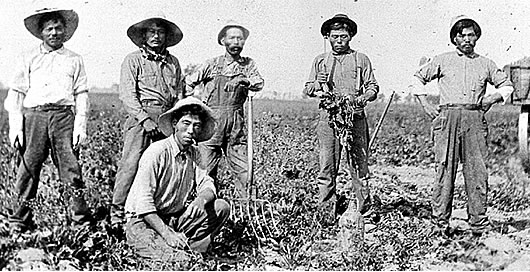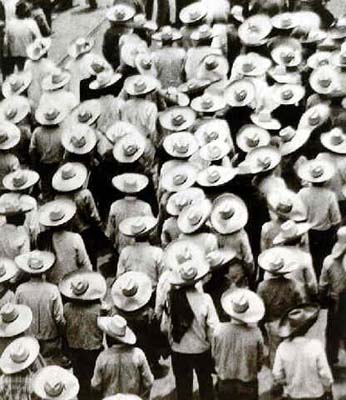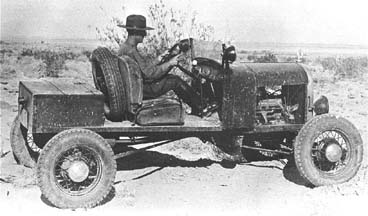
|
The Bracero Program The Mexican migrant worker has been the foundation
for the development of the rich American agricultural industry, and the
El Paso-Ciudad Juárez border region has played a key role in this
historic movement. One of the most significant contributions to the growth
of the agricultural economy was the creation of the Bracero Program in
which more than 4 million Mexican farm laborers came to work the fields
of this nation. The braceros converted the agricultural fields of America
into the most productive on the planet. |
|
The following corrido is called "El mojado" or "The Wetback". This corrido tells the story of an immigrant who narrowly escaped deportation. Many of the braceros experienced harassment such as this afer their contracts were up and they were being forced back to Mexico. The picture below shows some braceros at work in the feilds. |
 |
|
El Mojado Les aseguro cuanto he sufrido Me preguntaron por pasaporte ‘Subete al carro' me dijo el jefe Luego me dicen ‘Vete a tu casa’ Pues me miraron de arriba a bajo Muy asustado llegué a mi casa Esas [boletos] son abusados Pues si me dicen ‘Saca el registro’ Porque en mi patria vivo pensando |
The Wetback I’m a wetback and no one knows I assure you of how much I’ve suffered They asked me for a passport ‘Get in the car’ the boss told me Then they tell me ‘Go to your house’ Well, they looked me up and down I arrived home frightened Those tickets are abused Well if they tell me ‘Take out your registration’ Because of my homeland I live thinking |
|
|
| The next corrido is called "El Bracero Fracasado". This song tells the sad story of a laborer who traveled to the U.S. to find work. He had trouble finding work and he traveled to different places in search of labor. He thought he finally got a break when he arrived in San Francisco but instead he was arrested. He feared going back to Mexico with nothing to show for his journey. This was all too common for many laborers that migrated to the north in search of work. |
 |
|
El Bracero Fracasado
|
The Failed Laborer
In Salinas they caught me
|
|
|
|
The last corrido is "El Patero del Año". This corrido tell sthe story of an immigrant who got arrested for smuggling. This is comical because he was then named "The Smuggler of the Year" when he was just helping a larger group of smugglers.The photo below is that of a desert patrol car. Cars like this often patrolled for smugglers and illegal immigration. |
 |
|
El Patero Del Año
|
The Smuggler of the Year
The 24th of June
|